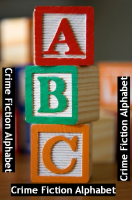Another good month for reading. Mostly crime fiction, but I also read some non-fiction and a classic novella. And eight of the books were from my TBR piles, so that is good too.
Mystery Reference
American Noir: The Pocket Essential Guide to US Crime Fiction, Film & TV (2017)by Barry Forshaw
I have read several mystery reference books by Barry Forshaw in the last few months, and this is my least favorite. There are some decent overviews of some very well-known authors, and the TV and movie coverage is good, but the other books he authored provided better coverage for specific geographical locations (the UK and Scandinavia) or types of mysteries (historical). Most of his mystery reference books, including this one, focus on contemporary, living crime writers.

Nonfiction / Self-help
The Gentle Art of Swedish Death Cleaning (2017) by Margareta MagnussonThe subtitle of this book is: How to Free Yourself and your Family from a Lifetime of Clutter. The book is full of humor and useful hints on how to cut down on possessions. I enjoyed it, and it is brief and not cutesy.
Fiction
Breakfast at Tiffany's (1958) by Truman CapoteRead for the Back to the Classics challenge and for the Classics Club Spin #21. See my thoughts here.
Crime Fiction
Dissolution (2003) by C.J. SansomI don't usually read historical mysteries just to learn about the time period. But in this case I could, the time period in this book is so interesting and I know so little about it. King Henry VIII is in power and is working to eliminate Roman Catholic monasteries in England. Matthew Shardlake, an attorney who works for Thomas Cromwell, is sent to look into, and resolve, a murder at a monastery in Scarnsea. Luckily the writing is very good, the characters are engaging, and the merging of historical facts and characters blends well into the story, so this is a good read all around.
Killer's Choice (1957) Ed McBain
I finally got back to reading the 87th Precinct series after four years. This is the 5th in the series. See my thoughts here.
Wicked Uncle (1947) by Patricia Wentworth
#12 in the Miss Silver series, also published as Spotlight. Many of the novels in this series feature a romance, to some extent. This one is heavy on the romantic aspect, and Miss Silver shows up only briefly toward the beginning and then comes in to help with the solution to the crime towards the end of the story. Actually I liked these aspects of the story, but somehow this one did not impress me as much at the two previous Miss Silver books I had read. The post-war setting was very good, though.
Killed in the Ratings (1978) by William L. DeAndrea
This is an author I have been planning to read for years, and I finally did it. I have several of his books, from different series. Killed in the Ratings was DeAndrea's first novel, and he won the Edgar for Best First Novel. The novel's protagonist is Matt Cobb, who works in the TV industry as a troubleshooter. I will be reading more books by this author.
Bitter Recoil (1992) by Steven F. Havill
I read my first book in Steven F. Havill's 24-book series about Undersheriff Bill Gastner in September. I loved it so I promptly found a copy of this second book in the series, and I enjoyed it just as much. So now I am looking for book #3. This is definitely a series I recommend.

Charlie M (1977) by Brian Freemantle
This is the first book in the Charlie Muffin espionage series, and I have been wanting to read it for years. It did not disappoint, and I already have the 2nd one so I will continue the series.The Hypnotist (2009) by Lars Kepler
#1 in the Joona Linna police procedural series. This book has many elements I don't care for: tons of violence and gore, much above the level I find acceptable; very long, 503 pages; characters behaving in ways I don't understand. But I did enjoy reading the book, and that is what counts. I will read another from this series when I happen upon a copy. Translated from the Swedish by Ann Long.











